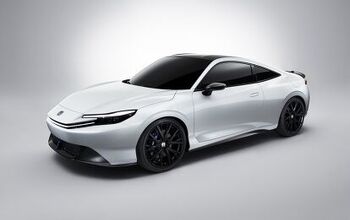Chief Engineer: Next Gen Prius Will Get Better Gas Mileage, Cost Less
Toyota’s Satoshi Ogiso and Bob Carter address the global media gathered in Ypsilanti for Toyota’s Hybrid World Tour press event
The chief engineer for Toyota’s Prius program, Satoshi Ogiso, who is also managing officer of Toyota Motor Corp, gave some hints about the next generation of Toyota’s highest profile hybrid car at a presentation held as part of Toyota’s Hybrid World Tour, a press event that gathered together all of Toyota’s hybrid cars sold around the world for the first time in one place, in Ypsilanti, Michigan, not far from Toyota’s large R&D center in Ann Arbor.
Ogiso, who oversees product planning and chassis engineering for Toyota, said that while the company continues to work on fuel cell cars and expects to be selling 10,000 or more fuel cell cars a year by the 2020s, Toyota is committed to the concept of hybrid cars that combine electric motors and combustion engines. Due to refinements in Toyota’s Hybrid Synergy Drive, the next Prius will get “”significantly better fuel economy in a more compact package that is lighter weight and lower cost, Ogiso said.
“The performance of this next generation of powertrains will reflect significant advances in battery, electric motor and gas engine technologies,” the Toyota engineer said. He also said that while hybrid components will get smaller, the footprint and interior dimensions of the Prius will remain the same.
Comparing a 10% gain in fuel economy to sprinter Usain Bolt taking a second off his world record in the 100 meter dash, Osigo said that Toyota is aiming at 55 mpg for the next Prius, compared to 50 mpg for the current model. In response to a question about when that next Prius will arrive in showrooms, Osigo gave the standard ‘can’t comment on future product plans’ response but then pointed out that the first three iterations of Toyota’s flagship hybrid were spaced six years apart, hinting strongly that the new Prius will be launched in 2015.
That car’s traction batteries will have a higher energy density, and its electric motor, though smaller, will put out more power. Toyota is also aiming for a thermal efficiency of 40% for the gasoline fired combustion engine, which would be the world’s most efficient.
Future models of the Prius may also feature a wireless charging system that Toyota will being testing next year.
Ogiso said that the next Prius will be the first Toyota to use the company’s New Global Architecture platform and it will have a lower center of gravity and better structural rigidity.
Ogiso also addressed other alternative energy developments at Toyota, including hydrogen fuel cells and supercapacitors. While Toyota is already planning production fuel cell cars within the next decade, supercapacitors, which are used in Toyota’s TS030 LeMans racer, also on display at the event, are not yet ready for use in a street car.
More by TTAC Staff
Latest Car Reviews
Read moreLatest Product Reviews
Read moreRecent Comments
- Rochester I'd rather have a slow-as-mud Plymouth Prowler than this thing. At least the Prowler looked cool.
- Kcflyer Don't understand the appeal of this engine combo at all.
- Dave M. This and the HHR were GM's "retro" failures. Not sure what they were smoking....
- Kcflyer Sorry to see it go. The interior design and color options in particular are rare in the industry
- Wolfwagen Here is my stable. not great not bad I try to do as much as possible. I work for an Aftermarket automotive parts company so I can get most parts at a discount.i try to do as much of my own work as possible. My wife hates that I spend time and money fixing the vehicles but she doesn't want car payments either so...2019 VW Atlas 50K (wife's) Only issues so far were Brakes and normal maintenance.A Bad Cat Converter which was covered and a replacement of the rear bank head gasket which was a manufacturing defect due to improper torquing at the factory. All under warranty2003 Saab 9-5 Arc Wagon (my DD) 116 K picked up used last year. Replaced Struts, brakes, hatch struts, motor mounts, D/S swaybar link, Timing belt, water pump and thermostat Power steering pump Fuel pump, Both Front window regular rollers, Heater core and cabin air filter. Oil and transmission changes. Love the car but Saab/GM packaging is a nightmare.2005 Cadillac Deville (former DD now Son # 1 DD) picked up used 5 years ago with only 47K now 83K Plugs, coils, P/s pump, Water pump, hoses, P/S lines (mechanic job) evap valve, brakes, Front brake calipers and rear brake calipers. Currently has oil pan gasket leak - looking to have a mechanic do that2009 Mini Cooper (Daughters dd)picked up 2 years ago 67K Brakes and thermostat house to clear check engine light2001 Mazda Tribue (Son#2 dd) 106K picked last summer after he severely damaged a 2004 Hyundai accent. Oil changes


































Comments
Join the conversation
Nice to know the slow, deliberate Prius driver in front of me, keeping me from getting where I want to go expeditiously, will be getting even better gas mileage.
The tiresome "return on investment" argument regarding hybrids just won't go away. Maybe some people buy hybrids because they can get from here to there without burning as much gas. Maybe it's sort of like a hobby. No one applies ROI to hobbies. In fact, no one seems to bring up ROI criticism to any other embellishments people typically add to perfectly serviceable basic cars. As for the elimination of gas station stops, this is not all that useful without also using a catheter or something.